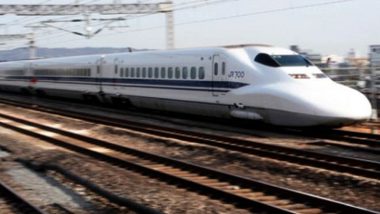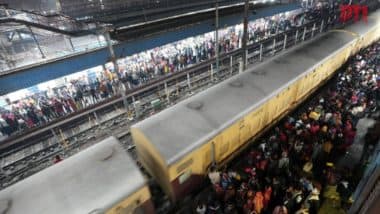New Delhi, September 5: The ambitious 508 km-long Ahmedabad-Mumbai High Speed Rail Project, popularly known as the Bullet Train project, will be impacted by the ongoing Covid-19 pandemic, officials said on Saturday. Prime Minister Narendra Modi and his former Japanese counterpart Shinzo Abe on September 14, 2017 had laid the foundation stone of the ambitious Rs 1.08 lakh crore ($17 billion) project. Speaking to IANS, National High Speed Rail Corporation Limited (NHSRCL) Achal Khare said, "Due to the ongoing Covid-19 pandemic there is an impact on the project as we are unable to do many things."
He said, "We cannot assess how much impact this pandemic will have on the project as this pandemic is continuing." He was responding to a question if the Bullet train project will be delayed or miss its deadline of December 2023. When asked about the impact of the Covid-19 pandemic of the tenders, the NHSRCL floated last year for many works, Khare said, last year we opened the tender for the undersea tunnel project to the Japanese bidders. Mumbai-Ahmedabad Bullet Train Project to Miss Its Deadline of December 2023 Due to COVID-19 Pandemic.
"Had there been normal times things could have been different, now the perception is completely different. Now the Japanese have opened this tender for Indians, so this will have an impact," Khare said.
He also said that for other tenders, too, since people were not able to prepare their bids, as some of the offices were closed and some of the offices were in containment zones, the opening of a few tenders had been postponded. According to the NHSRCL official, a 21 km-long tunnel will be dug between Boisar and BKC in Mumbai, seven km of which will be under the sea.
According to the NHSRCL officials, one of the civil work contracts for construction of stations, bridges, viaducts, maintenance depots, and tunnels across the network is to the tune of Rs 20,000 crore.
According to the NHSRCL official, the tender for the design and construction of the civil and building works, including testing and commissioning of 237 km length of the mainline out of the elevated 460 kms has been floated. The mainline also has one mountain tunnel of about 280 metre, 24 river crossings and 30 road and canal crossings.
The works related to the utility diversion are progressing well and the construction of Sabarmati passenger hub (a multi modal hub) in Sabarmati, Gujarat has also started. The Japan International Cooperation Agency (JICA) and the Union Railway Ministry have inked a memorandum of understanding (MoU) for the 508-km corridor, with Japan to partially fund the project.
According to NHSRCL a total of 1,380 hectare land is required for the high speed train project, out of which the Railways have acquired 479 hectare from private persons and 119 hectare from government land.
The official said that NHSRCL has already acquired 63 per cent of the land for the project out of which about 77 per cent land is in Gujarat, 80 per cent in Dadra Nagar Haveli and 22 per cent in Maharashtra. He said there are still issues in acquiring land in areas like Palghar in Maharashtra and Navsari in Gujarat.
The 508.17-kilometre long network will pass through three districts in Maharashtra -- Mumbai, Thane, and Palghar and eight districts in Gujarat -- Valsad, Navsari, Surat, Bharuch, Vadodara, Anand, Kheda and Ahmedabad.
The initial deadline to complete the ambitious project was December 2023. The Bullet Trains are expected to run at 350 km per hour covering the 508 km stretch in about two hours. In comparison, trains currently plying on the route take over seven hours to travel the distance, whereas flights take about an hour.
(The above story first appeared on LatestLY on Sep 05, 2020 05:18 PM IST. For more news and updates on politics, world, sports, entertainment and lifestyle, log on to our website latestly.com).













 Quickly
Quickly





















